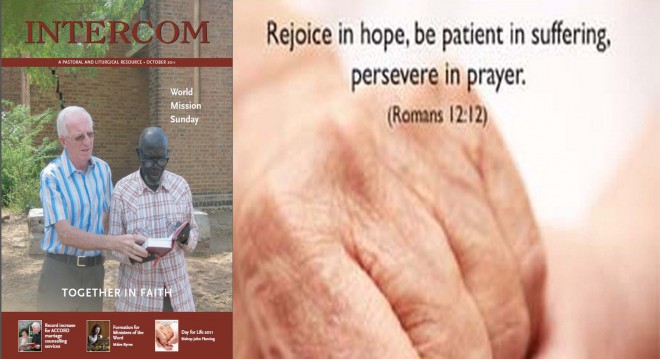 October 2011 issue
October 2011 issue
Click on link to view Intercom October contents
Editorial and Newsletter resources
Feature Article
Day for Life 2011
Bishop John Fleming
DAY FOR LIFE 2011
Every year the Church celebrates a ‘Day for Life’. InIreland,Scotland,EnglandandWales, the message of the Day for Life 2011 addresses the current difficult situation in which we find ourselves at present, economically and as Church. It takes as its inspiration the word of St Paul to the Romans; ‘Rejoice in hope, be patient in suffering, persevere in prayer’ (Rom 12:12). It is, in particular, a call to solidarity and hope in difficult times.
This year, therefore, the Day for Life focuses on what it means to live a full and happy life. It takes as its starting point the words of Pope Benedict during his recent visit to Britain, when he said, ‘Happiness is something we all want, but one of the great tragedies in this world is that so many people never find it, because they look for it in the wrong places. The key to it is very simple – true happiness is to be found in God. We need to have the courage to place our deepest hopes in God alone, not in money, in a career, in worldly success, or in our relationships with others, but in God. Only he can satisfy the deepest needs of our hearts’ (Pope Benedict XVI, The Big Assembly: Address to Pupils, Twickenham, 17 September 2010).
In a culture that often measures happiness in terms of pleasure, success, money and the so called ‘good life’, many are now asking themselves some very basic questions about what brings true meaning and joy to life.
The Day for Life this year reminds us that for the Christian the deepest joy in life does not come from what I have or what I can achieve. It comes from the knowledge that even before I was formed in my mother’s womb I was known and loved by God, my Creator (Jer. 1:5; Psalm 139): that from the first moment of conception to natural death I am loved personally by God and have an eternal future. It comes from knowing that every minute of life is enfolded by God’s loving care and that life itself will not end in emptiness. As Blessed John Henry Newman once wrote, ‘God has created me to do him some definite service… He has not created me for naught’. God has a plan for me and ‘that plan is for good, not for disaster, to give you a future and a hope’ (Jer. 29:1-14).
God’s love offers a life that is ‘truly’ life because it is a life not measured by achievements but in the very fact that I am – and that I am eternally loved. In the certain knowledge that ‘nothing can separate us from the love of Christ’ (Rom 8:39), my life can still be rich in meaning and constant in hope in the face of setbacks, suffering and even death itself. God’s love gives us the possibility of persevering day by day with patient joy, spurred on by hope, in a world which by its very nature is imperfect. The Day for Life this year touches the very foundation of our lives and our existence, the fact that no matter what happens to us or in what difficult circumstances we find ourselves, we are loved by God, supported by his forgiveness and surrounded by his love.
When setbacks come, the friendship and care shown to us by others becomes a vital source of comfort, meaning and hope. These supports are the practical, physical expression of God’s love for us. Building a culture of life, therefore, also commits us to building a civilisation of love: it involves showing practical solidarity and concern for those around us who are in need. A society that protects those who are vulnerable and weak, contributes to our shared happiness: a society that shows love and concern for others who are in need enhances our quality of life.
As a society we have a strong tradition of good neighbourliness and of showing mutual help. Day for Life is an opportunity to ask ourselves if there anything more we can do to be of help to my neighbours, to improve the quality of life of others and of society as a whole, especially in these financially challenging times?
By embracing a culture of life and standing with those marginalized and deemed ‘useless’ or a ‘burden’ on society, we can turn the values of our consumer society upside down. We can contribute to the happiness and quality of life of all by ensuring respect for the life of every person, from conception to natural death. We can work toward creating a civilisation of love, rooted in a culture of life, by reaching out to those who are suffering in any way, especially those suffering as a result of this recession.
Day for Life this year is a call to us to work for a society in which all are valued as created, loved by God, redeemed by Christ; not for their fame, or power or what they own but for their intrinsic worth. It is a call to rediscover the truth that our deepest happiness and joy comes from the knowledge that we are all loved by God from the very beginning and that trusting in God’s love, through our setbacks and difficulties, our own ‘joy will be complete’ (John 10:10).
To view the article in pdf format, click here.
Intercom
Intercom is a pastoral and liturgical resource magazine published by Veritas, an agency of the Irish Catholic Bishops Commission on Communications.
There are ten issues per year, including double issues for July-August and December-January.
For information on subscribing to Intercom, please contact Ross Delmar (Membership Secretary):
Tel: +353 (0)1 878 8177 Email: [email protected]
